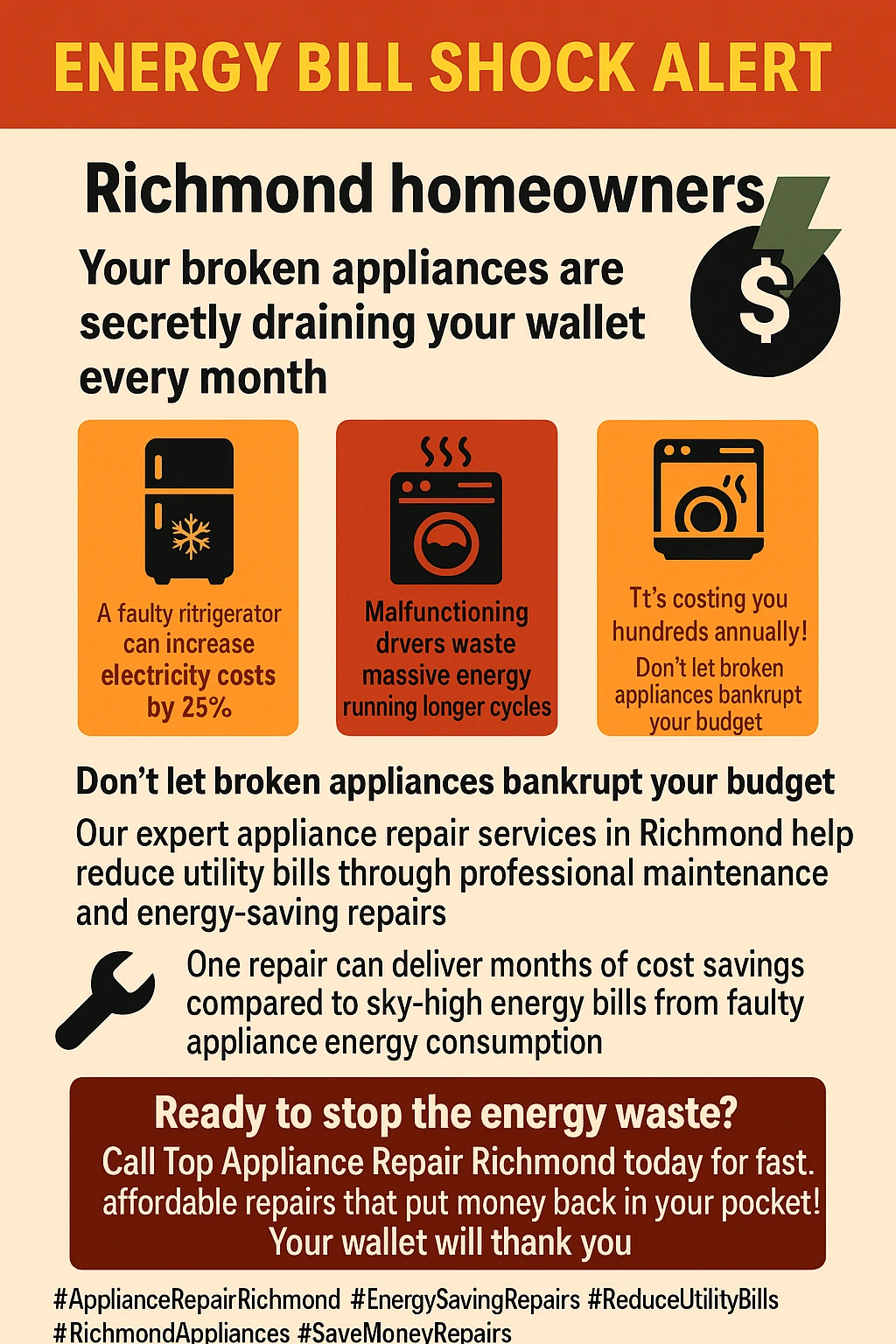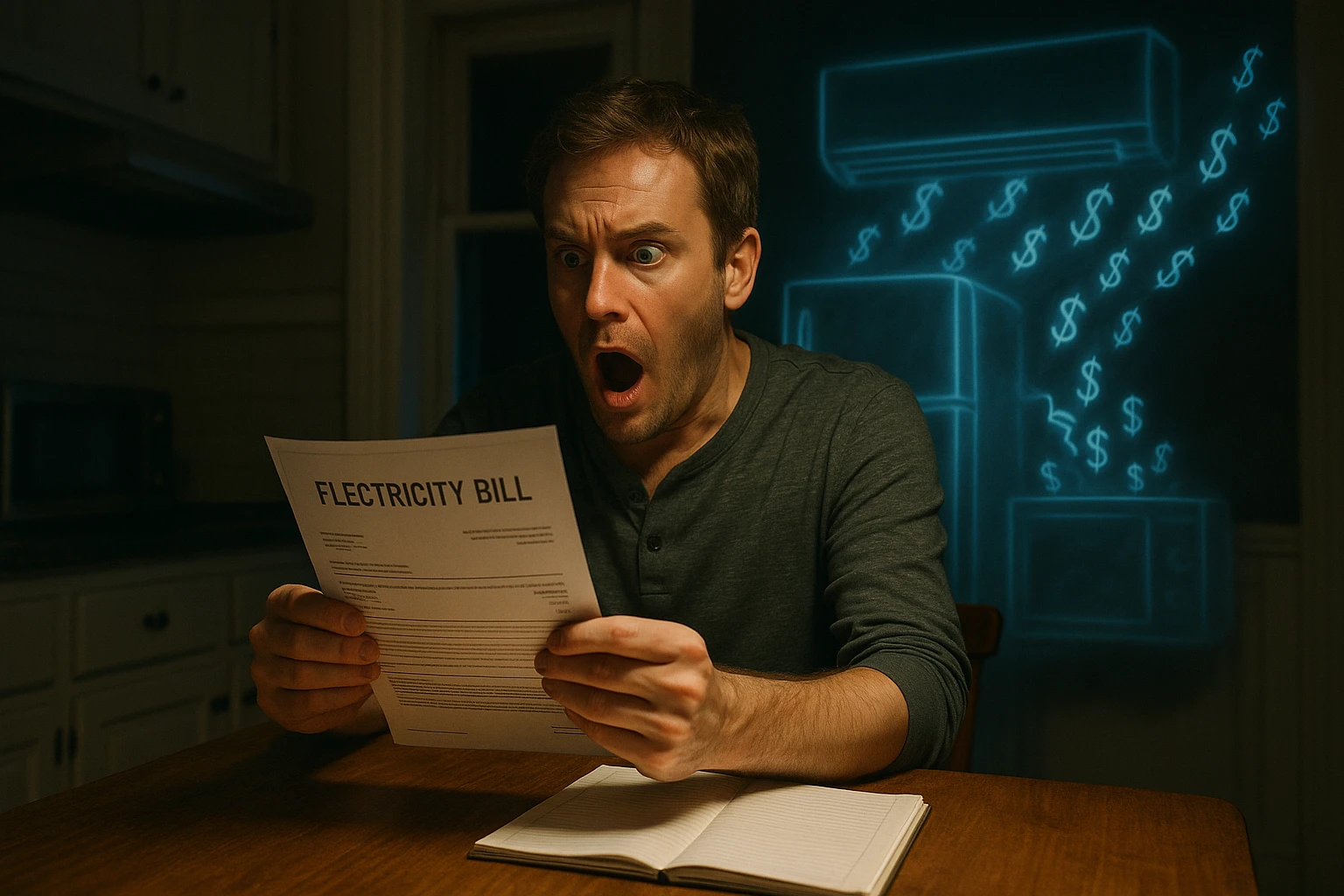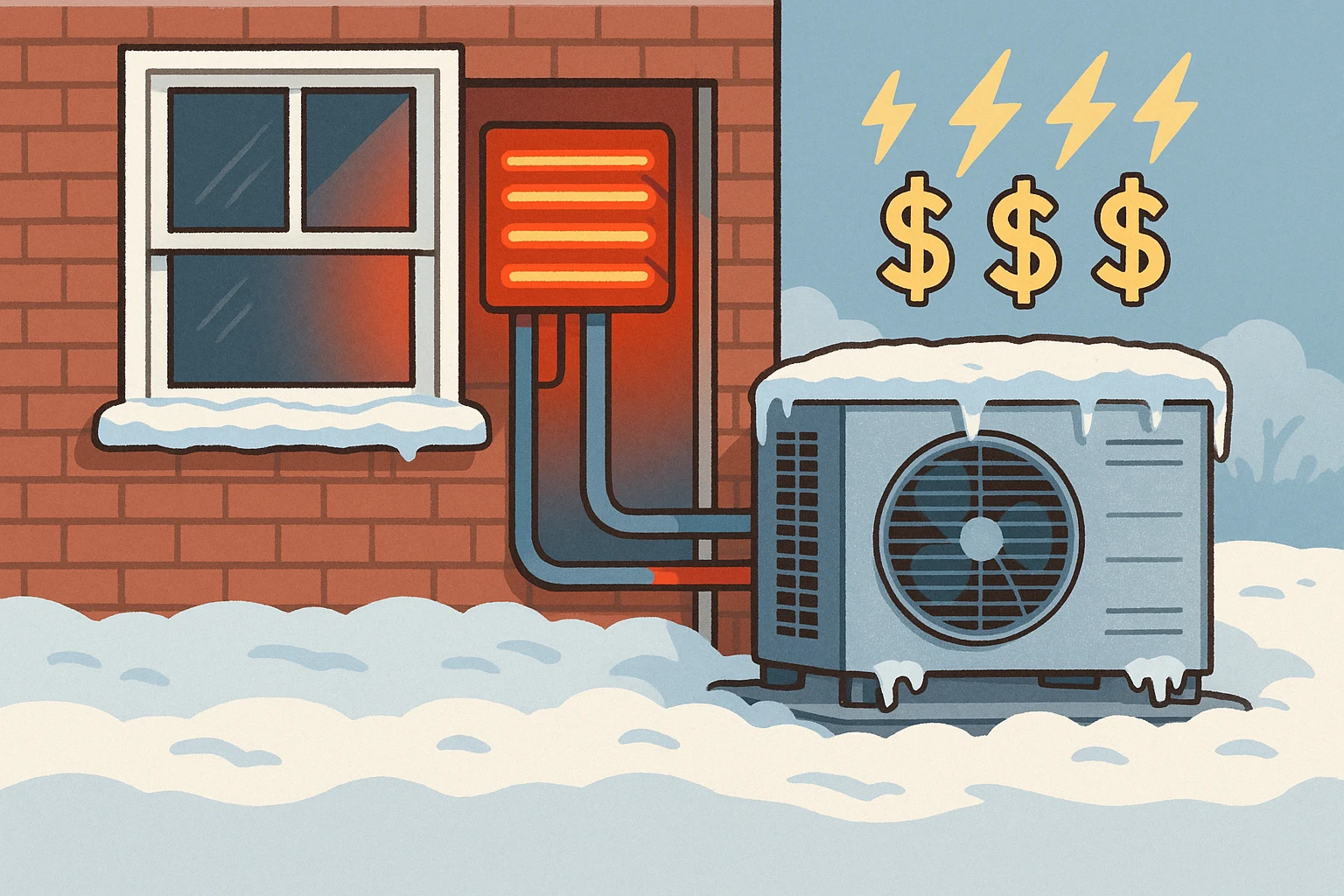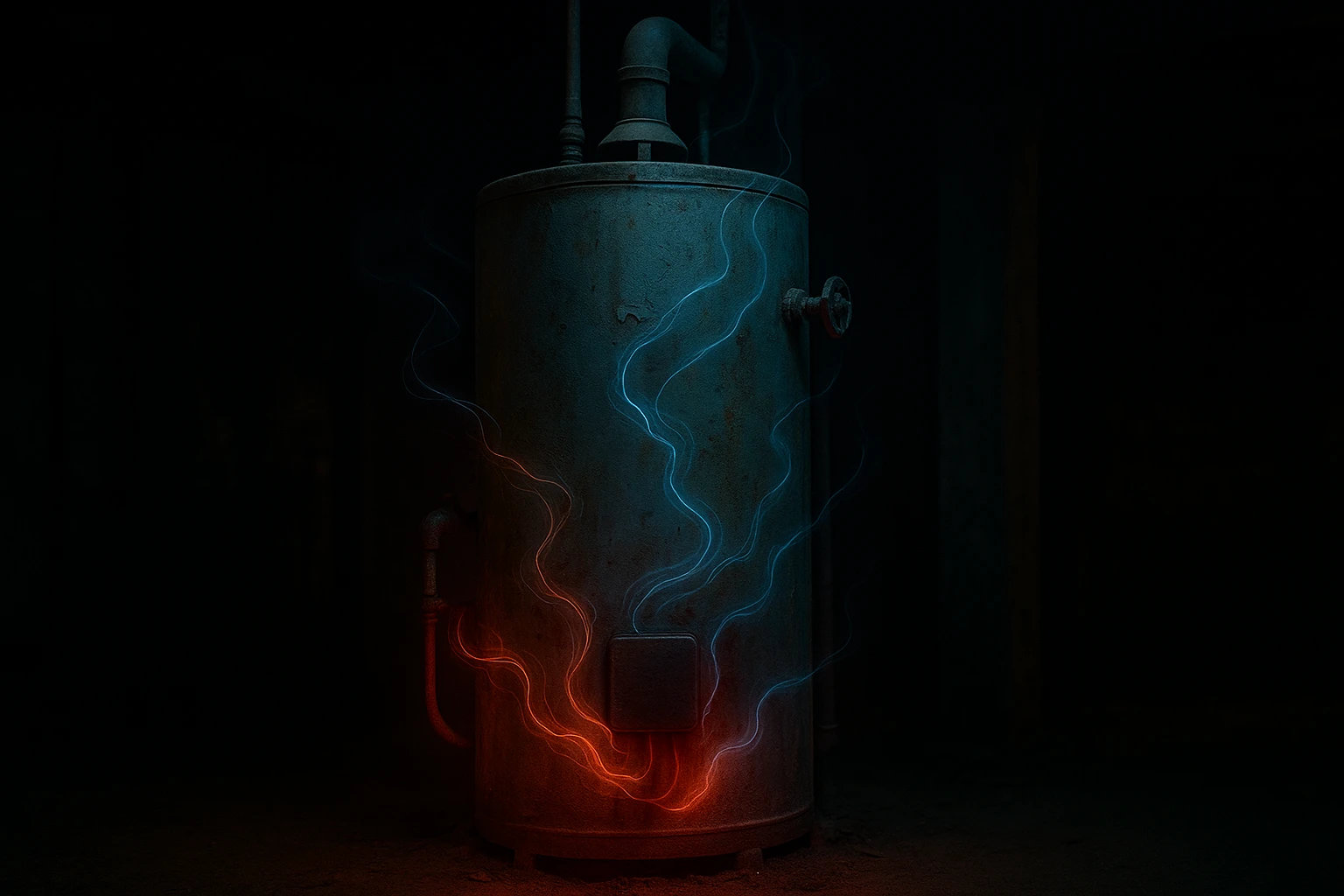Energy Bill Shock? How Broken Appliances Are Secretly Draining Your Wallet
Wondering why your Richmond energy bill has suddenly jumped through the roof? Your trusty appliances might be the culprits, quietly guzzling electricity and burning through your hard-earned cash while you sleep.Picture this: you’re scrolling through your latest Dominion Energy bill, and your jaw literally drops to the floor. That number at the bottom can’t be right, can it? You’ve been keeping the thermostat at a reasonable temperature, you’re not running a Bitcoin mining operation in your basement, and yet somehow your electricity usage has gone through the stratosphere. Before you start pointing fingers at Richmond’s utility rates or assume there’s been some cosmic billing error, take a closer look at what’s happening inside your home. The truth is, when appliances start to malfunction or age beyond their prime, they become energy vampires that can double or even triple your monthly costs. These mechanical money-munchers work overtime to deliver the same results they used to achieve effortlessly, and that extra effort translates directly into higher kilowatt-hour consumption. What’s particularly sneaky about this situation is that broken appliances often continue to “work” in the sense that they still turn on and perform their basic functions, but they’re doing so incredibly inefficiently. In Richmond’s climate, where we face both sweltering summers and surprisingly chilly winters, our appliances already work harder than they would in more moderate climates. When you add mechanical problems to the mix, you’re looking at a perfect storm for energy waste. Understanding which appliances are the biggest culprits and how to spot the warning signs can save you hundreds of dollars annually and prevent those heart-stopping moments when you open your utility bill.
Key Outtakes:
- Malfunctioning HVAC systems are the biggest energy drains, especially when emergency heat strips activate unnecessarily
- Old refrigerators, water heaters, and dryers can increase energy consumption by 50-100% when components start failing
- Simple maintenance issues like dirty filters and worn seals can cause appliances to work significantly harder
- Richmond residents face unique challenges with energy costs due to older housing stock and weather extremes
- Regular appliance maintenance and strategic upgrades can reduce energy bills by 20-40% annually

The Hidden Energy Drains Lurking in Your Richmond Home
Living in Richmond means dealing with a unique set of energy challenges that many homeowners don’t fully appreciate. Our city’s housing stock includes everything from charming 1920s bungalows to mid-century ranch homes, many of which still house their original appliances or aging replacements that are working overtime to keep up with modern demands. When these appliances start to fail, they don’t just stop working altogether – they begin a slow decline that shows up most dramatically in your monthly energy consumption. The most insidious part about appliance-related energy waste is how gradually it creeps up on you. Unlike a complete breakdown that forces immediate action, declining efficiency happens so slowly that you might not notice the problem for months or even years. Your refrigerator might still keep food cold, but its compressor could be running twice as long to maintain the same temperature. Your water heater might still deliver hot showers, but it could be working around the clock to compensate for a failing heating element or excessive sediment buildup. Richmond’s climate compounds these issues significantly. During our humid summers, air conditioners and dehumidifiers work harder than they would in drier climates, and any mechanical issues become magnified under this increased workload. Similarly, when winter temperatures drop into the teens or twenties, heat pumps struggle to extract warmth from the cold air, often triggering expensive auxiliary heating systems that can triple your electricity costs overnight. Many Richmond residents experience severe energy burden, spending disproportionate amounts of their income on utilities partly due to these inefficiency issues.
The most insidious part about appliance-related energy waste is how gradually it creeps up on you. Unlike a complete breakdown that forces immediate action, declining efficiency happens so slowly that you might not notice the problem for months or even years. Your refrigerator might still keep food cold, but its compressor could be running twice as long to maintain the same temperature. Your water heater might still deliver hot showers, but it could be working around the clock to compensate for a failing heating element or excessive sediment buildup. Richmond’s climate compounds these issues significantly. During our humid summers, air conditioners and dehumidifiers work harder than they would in drier climates, and any mechanical issues become magnified under this increased workload. Similarly, when winter temperatures drop into the teens or twenties, heat pumps struggle to extract warmth from the cold air, often triggering expensive auxiliary heating systems that can triple your electricity costs overnight. Many Richmond residents experience severe energy burden, spending disproportionate amounts of their income on utilities partly due to these inefficiency issues.
HVAC Systems: The Biggest Energy Culprits in Richmond Homes
When it comes to energy consumption in Richmond homes, your heating, ventilation, and air conditioning system is both your biggest necessity and your biggest potential money pit. HVAC systems typically account for more than half of your home’s total energy usage, which means that even small inefficiencies can translate into significant dollar amounts on your monthly bill. The problem becomes particularly acute when these systems start to malfunction in ways that aren’t immediately obvious to homeowners. One of the most common and expensive HVAC issues affecting Richmond residents involves the emergency or auxiliary heat strips that activate when heat pumps can’t keep up with demand. Under normal circumstances, these strips should only engage during extremely cold weather or when there’s a significant temperature differential between your thermostat setting and actual room temperature. However, when heat pumps develop problems like low refrigerant levels, dirty coils, or failing components, they struggle to heat your home efficiently, causing the emergency heat to kick in frequently. Emergency heat strips are essentially giant electric resistance heaters that consume enormous amounts of electricity – often three to five times more than your heat pump operating normally. Richmond homeowners frequently report electricity bills jumping from $150 to $500 or more when these strips start running continuously. The cruel irony is that many people don’t even realize their emergency heat is running because their homes still feel warm. Modern thermostats often display when auxiliary heat is active, but many residents either don’t notice these indicators or don’t understand what they mean. Air conditioning problems create similar energy waste during Richmond’s hot, humid summers. When AC units develop issues like dirty coils, low refrigerant, or failing compressors, they run longer cycles to achieve the same cooling effect. A properly functioning air conditioner should cycle on and off throughout the day, but a struggling unit might run continuously, consuming electricity at maximum capacity while barely maintaining comfortable temperatures. This continuous operation not only skyrockets your energy bills but also accelerates wear on other components, leading to more expensive repairs down the road. Poor insulation and air leaks compound HVAC efficiency problems significantly. Many Richmond homes, particularly older ones, have inadequate insulation in walls, attics, and crawl spaces, forcing HVAC systems to work harder to maintain consistent temperatures. When your heating or cooling system is already struggling with mechanical issues, these building envelope problems push energy consumption even higher. Several factors contribute to unexpected energy bill increases, and addressing both mechanical and structural issues is often necessary for meaningful improvement.
One of the most common and expensive HVAC issues affecting Richmond residents involves the emergency or auxiliary heat strips that activate when heat pumps can’t keep up with demand. Under normal circumstances, these strips should only engage during extremely cold weather or when there’s a significant temperature differential between your thermostat setting and actual room temperature. However, when heat pumps develop problems like low refrigerant levels, dirty coils, or failing components, they struggle to heat your home efficiently, causing the emergency heat to kick in frequently. Emergency heat strips are essentially giant electric resistance heaters that consume enormous amounts of electricity – often three to five times more than your heat pump operating normally. Richmond homeowners frequently report electricity bills jumping from $150 to $500 or more when these strips start running continuously. The cruel irony is that many people don’t even realize their emergency heat is running because their homes still feel warm. Modern thermostats often display when auxiliary heat is active, but many residents either don’t notice these indicators or don’t understand what they mean. Air conditioning problems create similar energy waste during Richmond’s hot, humid summers. When AC units develop issues like dirty coils, low refrigerant, or failing compressors, they run longer cycles to achieve the same cooling effect. A properly functioning air conditioner should cycle on and off throughout the day, but a struggling unit might run continuously, consuming electricity at maximum capacity while barely maintaining comfortable temperatures. This continuous operation not only skyrockets your energy bills but also accelerates wear on other components, leading to more expensive repairs down the road. Poor insulation and air leaks compound HVAC efficiency problems significantly. Many Richmond homes, particularly older ones, have inadequate insulation in walls, attics, and crawl spaces, forcing HVAC systems to work harder to maintain consistent temperatures. When your heating or cooling system is already struggling with mechanical issues, these building envelope problems push energy consumption even higher. Several factors contribute to unexpected energy bill increases, and addressing both mechanical and structural issues is often necessary for meaningful improvement.
Water Heaters: Silent Energy Vampires
Water heaters represent one of the most overlooked sources of energy waste in Richmond homes, primarily because they operate quietly in basements, utility closets, or garages where homeowners rarely think about them. These appliances typically account for 15-20% of your home’s total energy consumption, making them the second-largest energy user after HVAC systems. When water heaters start to fail, their energy consumption can increase dramatically while their performance appears relatively normal to casual observation. Sediment buildup is perhaps the most common issue affecting water heater efficiency in Richmond, where our water has moderate mineral content that accumulates over time. As sediment settles at the bottom of the tank, it creates an insulating barrier between the heating element and the water, forcing the heater to work much longer to achieve the same temperature. This extended heating cycle can increase energy consumption by 25-50% or more, depending on the severity of the buildup. Most homeowners never realize this is happening because their hot water supply seems adequate, even though the unit is working overtime behind the scenes. Failing heating elements create similar problems but are often even more difficult to diagnose. When one of the two heating elements in an electric water heater starts to deteriorate, the remaining element has to work continuously to compensate. This not only increases energy consumption significantly but also dramatically shortens the lifespan of the surviving element, often leading to complete system failure within months. Gas water heaters face similar issues when burners become dirty or misaligned, reducing heating efficiency and forcing longer burn cycles. Tank insulation problems contribute substantially to water heater energy waste, particularly in Richmond’s climate where seasonal temperature swings affect basement and crawl space temperatures significantly. Older water heaters often have minimal insulation, and even newer units can benefit from additional insulation blankets. When hot water tanks lose heat rapidly to surrounding air, the heating elements or burners must cycle on more frequently to maintain temperature, consuming energy even when no hot water is being used. Location-related efficiency issues plague many Richmond water heaters, particularly those installed in unheated garages, crawl spaces, or basements. During winter months, these spaces can become quite cold, forcing water heaters to work much harder to heat incoming cold water and compensate for heat loss through pipes and the tank itself. Some homeowners don’t realize that moving a water heater to a conditioned space or better insulating the surrounding area can reduce energy consumption by 10-20% annually. The age factor cannot be overlooked when evaluating water heater efficiency. Units more than 8-10 years old often operate at significantly reduced efficiency even when they appear to function normally. Modern water heaters incorporate better insulation, more efficient heating elements, and improved controls that can reduce energy consumption by 20-30% compared to older units. Strategic appliance upgrades often pay for themselves through reduced energy costs within just a few years.
Sediment buildup is perhaps the most common issue affecting water heater efficiency in Richmond, where our water has moderate mineral content that accumulates over time. As sediment settles at the bottom of the tank, it creates an insulating barrier between the heating element and the water, forcing the heater to work much longer to achieve the same temperature. This extended heating cycle can increase energy consumption by 25-50% or more, depending on the severity of the buildup. Most homeowners never realize this is happening because their hot water supply seems adequate, even though the unit is working overtime behind the scenes. Failing heating elements create similar problems but are often even more difficult to diagnose. When one of the two heating elements in an electric water heater starts to deteriorate, the remaining element has to work continuously to compensate. This not only increases energy consumption significantly but also dramatically shortens the lifespan of the surviving element, often leading to complete system failure within months. Gas water heaters face similar issues when burners become dirty or misaligned, reducing heating efficiency and forcing longer burn cycles. Tank insulation problems contribute substantially to water heater energy waste, particularly in Richmond’s climate where seasonal temperature swings affect basement and crawl space temperatures significantly. Older water heaters often have minimal insulation, and even newer units can benefit from additional insulation blankets. When hot water tanks lose heat rapidly to surrounding air, the heating elements or burners must cycle on more frequently to maintain temperature, consuming energy even when no hot water is being used. Location-related efficiency issues plague many Richmond water heaters, particularly those installed in unheated garages, crawl spaces, or basements. During winter months, these spaces can become quite cold, forcing water heaters to work much harder to heat incoming cold water and compensate for heat loss through pipes and the tank itself. Some homeowners don’t realize that moving a water heater to a conditioned space or better insulating the surrounding area can reduce energy consumption by 10-20% annually. The age factor cannot be overlooked when evaluating water heater efficiency. Units more than 8-10 years old often operate at significantly reduced efficiency even when they appear to function normally. Modern water heaters incorporate better insulation, more efficient heating elements, and improved controls that can reduce energy consumption by 20-30% compared to older units. Strategic appliance upgrades often pay for themselves through reduced energy costs within just a few years.
Kitchen and Laundry Appliances: The Sneaky Energy Thieves
Kitchen and laundry appliances might seem like minor players in your home’s energy consumption, but when these workhorses start to malfunction, they can contribute significantly to inflated utility bills. The challenge with these appliances is that their energy waste often manifests in subtle ways that homeowners attribute to normal operation rather than mechanical problems that need attention. Refrigerators are particularly notorious for gradually increasing energy consumption as they age and develop problems. When door seals start to deteriorate, even slightly, the refrigerator’s compressor has to work harder to maintain consistent temperatures. A simple test involves closing a dollar bill in the refrigerator door – if you can easily pull it out, your seals likely need replacement. Dirty condenser coils create similar efficiency problems, as dust and debris prevent proper heat dissipation, forcing the compressor to run longer and work harder to cool the refrigerant. Temperature control problems in older refrigerators can double or triple energy consumption without completely failing to keep food cold. When thermostats become inaccurate, refrigerators might maintain temperatures much lower than necessary, or they might cycle on and off too frequently in an attempt to reach an unattainable target temperature. Many Richmond homeowners notice their refrigerators running constantly during summer months, assuming this is normal behavior when it actually indicates mechanical problems that need professional attention. Dryer efficiency issues represent another major source of hidden energy waste, particularly in Richmond’s humid climate where clothes naturally take longer to dry. When dryer vents become clogged with lint, clothes take significantly longer to dry, requiring multiple cycles or extended cycle times that can double or triple energy consumption per load. Lint buildup doesn’t just happen in the removable lint trap – it accumulates throughout the entire vent system, from the dryer to the exterior exhaust point. Heating element problems in electric dryers cause similar efficiency issues. When heating elements start to fail, dryers take much longer to generate adequate heat, extending cycle times and increasing energy consumption dramatically. Gas dryers face similar problems when burners become dirty or gas pressure becomes inadequate, reducing heating efficiency and requiring longer drying cycles to achieve the same results. Washing machine efficiency problems often fly under the radar because these appliances use relatively small amounts of energy compared to dryers and water heaters. However, when washing machines develop issues like worn drive belts, failing motors, or water temperature problems, they can increase energy consumption significantly while appearing to function normally. Hot water heating represents the largest portion of washing machine energy usage, so any problems affecting water temperature control or cycle timing can impact your energy bills substantially. Dishwasher efficiency issues typically involve heating elements that warm water and dry dishes. When these elements start to fail, dishwashers run longer cycles or require multiple cycles to achieve clean, dry dishes. Many Richmond residents don’t realize that their dishwashers heat water internally to temperatures much higher than their water heater provides, so failing heating elements force longer cycles and higher energy consumption.
Frequently Asked Questions
How can I tell if my heat pump’s emergency heat is running too often?
Most modern thermostats display “EM Heat,” “Aux Heat,” or a similar indicator when emergency heating strips are active. If you see this indicator frequently when outdoor temperatures are above 35°F, or if it stays on continuously for hours, your heat pump likely needs professional attention. You might also notice unusually warm air coming from vents, as emergency heat produces much hotter air than normal heat pump operation. Keep track of when you see these indicators and contact an HVAC professional if emergency heat is activating more than occasionally during mild weather. Emergency heat should primarily activate during defrost cycles (which last only a few minutes) or when outdoor temperatures drop below your heat pump’s effective operating range. In Richmond’s climate, well-functioning heat pumps shouldn’t need emergency heat assistance until temperatures drop into the twenties or below, depending on your specific unit and home insulation quality.
What are the warning signs that my water heater is wasting energy?
Several warning signs indicate your water heater is consuming more energy than necessary. If you notice it takes longer to get hot water at faucets, hear rumbling or popping sounds from the tank, see rusty or discolored hot water, or find that hot water runs out more quickly than usual, your water heater is likely working inefficiently. Lukewarm water when the temperature dial is set to normal indicates failing heating elements or excessive sediment buildup. Another key indicator is checking the area around your water heater for excessive heat. The tank should be warm to the touch but not uncomfortably hot, and the surrounding air shouldn’t feel significantly warmer than other areas of your basement or utility room. If the space feels like a sauna, your water heater is losing too much heat and working harder to compensate.
How much can broken appliances actually increase my energy bill?
The impact varies significantly depending on which appliances are affected and the severity of the problems, but the numbers can be substantial. A malfunctioning HVAC system running emergency heat can increase your electricity bill by 200-400% during winter months. Failing water heaters typically increase energy consumption by 25-75%, while refrigerator problems might add 50-100% to that appliance’s portion of your bill. Richmond residents frequently report winter electricity bills jumping from $150-200 to $400-600 when HVAC problems trigger excessive emergency heat usage. Combined appliance problems can easily double your total energy consumption, turning a typical $200 monthly bill into $400-500 or more during peak seasons.
Wrapping Up
Understanding how broken appliances secretly drain your wallet empowers you to take control of your Richmond energy costs and avoid those heart-stopping utility bill moments. The key insight is that appliances rarely fail completely overnight – they gradually become less efficient, consuming more energy while still appearing to function normally. By learning to recognize the warning signs and addressing problems early, you can prevent minor issues from becoming major financial burdens. Regular maintenance and timely repairs represent one of the most cost-effective investments you can make in your home’s energy efficiency. Simple actions like changing HVAC filters, cleaning refrigerator coils, and flushing water heater tanks can prevent many of the efficiency problems that lead to inflated energy bills. When appliances do need professional attention or replacement, addressing these issues promptly usually costs far less than months of inflated utility payments. Remember that Richmond’s climate and housing characteristics create unique challenges that amplify appliance efficiency problems. Our seasonal temperature extremes, humidity levels, and older housing stock mean that appliance maintenance and efficiency improvements often provide greater benefits here than in more moderate climates. Taking a proactive approach to appliance care and energy efficiency isn’t just about saving money – it’s about maintaining comfortable, reliable home systems that serve your family well year-round.
